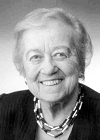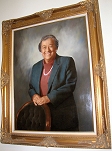Herta Taussig Freitag

December 6, 1908 - January 25, 2000
A Personal Reflection by Caren Diefenderfer, Hollins University
"I have finally found a subject where I do not need to memorize, but can think things out myself – mathematics."
Herta Taussig, born December 6, 1908 in Vienna, Austria, penned these words in her diary when she was 12 years old. The entry verifies the beginning of her love affair with mathematics. It was a love that would survive a world war, a move from Austria to England, and eventually a second move from England to the United States. It was mathematics that sustained her during challenging and difficult times. But, the remarkable qualities of this Viennese woman are that she had an incredibly positive outlook, always encouraged the best in everyone she met, found great joy in her work, and presented herself as a charming bundle of energy to those who knew her. Shortly after the above entry appeared in her diary, Herta wrote:
"I want to become a mathematics teacher."
And, six years later, she revised the entry to say:
"I don't want just to be a teacher of mathematics. I want to become a good teacher of mathematics."
Herta Taussig received the degree of Magister Rerum Naturalium in Mathematics and Physics from the University of Vienna in 1934. Kurt Godel completed his Ph.D. in logic at the University of Vienna in 1931 and Herta and her friends always delighted in catching the eye of the "handsome" young Godel. Herta taught at the University of Vienna as a "Gymnasium Professur" from 1934 to 1938. Herta's life took a dramatic change on March 11, 1938, the day that Hitler invaded Austria. Herr Taussig, an editor of Die Neue Frei Presse, had written editorials warning of the dangers of Nazism, and lost his job. Herta and her parents decided to move to a summer cottage in the mountains outside Vienna, to give themselves some time to make plans for the future. Herta's brother Walter Taussig, a musician, was touring the United States and decided to remain in the US. (Walter later became an assistant conductor for the Metropolitan Opera Company.) Herta and her parents immediately started to work on finding a sponsor to bring them to the United States. However, even when they identified a possible sponsor, they had to wait until their quota number was called up.
Immigration laws in Britain were different than those of the United States. The British were concerned about the plight of Nazi victims, but did not want to encourage large-scale immigration. Great Britain was not accepting immigrants seeking work as teachers, businessmen, or bankers, because they did not want new immigrants to take these jobs away from British citizens. Since Britain needed domestic servants, Herta applied to be a maid in England and was granted entry. She left Austria with the promise of a job as a maid for two elderly women in Sussex, England. Within a year or two, Herta's parents moved to England and lived nearby. Mary Ann Johnson's One Way Ticket is a thoughtful, careful and charming story of Herta's six years in England as a maid, governess, waitress and finally a mathematics teacher, while waiting for the moment when she and her parents could enter the United States. Herta's father died in 1943 and Herta and her mother sailed to the United States in 1944.
Herta obtained a job at a private high school, the Greer School, in upstate New York. There she met Arthur H. Freitag and they were married in 1950. Herta started teaching at Hollins College (now University) in Roanoke, VA in 1948. She received a Ph.D. degree from Columbia University in 1953 and the title of her dissertation was "The Use of the History of Mathematics in its Teaching and Learning on the Secondary Level."
During Herta's years at Hollins she was a frequent guest speaker at local schools and gave lectures at both Virginia and North Carolina Governor's Schools. She published numerous articles in The Mathematics Teacher, The Arithmetic Teacher, and The Mathematics Magazine. At the request of the National Council of Teachers of Mathematics, Professor Freitag wrote the monograph, The Number Story, with her husband. In 1962 she was the first woman to be President of the Maryland-District of Columbia-Virginia Section of the Mathematical Association of America (MAA). Professor Freitag received the Hollins' Algernon Sydney Sullivan Award, which is awarded for recognition of "extraordinary humane and scholarly achievement." She officially retired from Hollins in 1971 to spend time with her husband, who was ill. After his death in 1978, Hollins welcomed her back to the classroom as a leave replacement in 1979-1980 and as a teacher in the Master of Arts in Liberal Studies (MALS) program for several years. Professor Herta Freitag was the first faculty member to receive the Hollins Medal (1979) and the first recipient of the Virginia College Mathematics Teacher of the Year award (1980).
Professor Freitag was very proud of her perfect attendance at the International Conferences of the Fibonacci Association. Most of her work with Fibonacci numbers occurred after she retired, which demonstrates the fallacy of a commonly held belief that mathematicians complete their best work before the age of 40. Professor Freitag published more than thirty articles in the Fibonacci Quarterly after 1985. The November 1996 issue of the Fibonacci Quarterly was dedicated to "Herta Taussig Freitag as she enters her 89th year, in recognition of her years of outstanding service and achievement in the mathematics community through excellence in teaching, problem solving, lecturing and research." This award was given to celebrate her 89th birthday, since 89 is a Fibonacci number.
Those who knew and loved Professor Freitag would agree that her positive, thoughtful outlook on life was her most amazing quality. In "A Last Lecture – How Kind of you to Want to Know Me," she reflected on her nine months in Austria under Hitler and her six years in England, saying that,
"All of this is a blessing – at least I see it this way. It has given me a greatly heightened sense of appreciation of life in my adopted land, a sharpened delight in small joys, and a deep love for all that is good in the world. And, for me, one of the best things in this world is mathematics."

Professor Herta Taussig Freitag died on January 25, 2000 at the age of 91. One of my favorite memories of Herta Taussig Freitag is the 48 hours that I spent with her and one of her college friends in Vienna during the summer of 1980. When we viewed the Danube, Professor Freitag declared with joy in her eyes, "It is only blue to those who are in love." We travelled to Belvedere Palace to view the painting of her relative, Tina Blau, ate fine Viennese pastries and enjoyed an even finer friendship and joy. Sharing this time with Herta in Vienna was an amazing gift and a tribute to why Hollins is special to those who have taught and studied here. Herta's portrait, a gift from the class of 1953 and the mathematics majors from 1949-1976, greets me every day when I come to my office. The portrait serves as a reminder of our shared passions: travel, music, swimming, and most important, the joy of solving mathematics problems.
In May 1997, Professor Freitag received the Humanitarian Award of the National Conference of Christians and Jews. The citation stated:
"To have known her all these years, to have seen her joy of living expressed in so many ways, to have felt her gentle and guiding hand on the careers of so many, to have seen her look beyond hatred and see sharing, all these cannot be summarized better than to say wherever she has gone, whomever she has seen, she has left them richer and hoping to become more like her."
My life is certainly richer due to Herta's presence and friendship. Whenever we spent time together, I left knowing that if I could remain as active and engaged with life and academics as Herta, growing old would be just fine. The ability to share my enthusiasm for mathematics with current Hollins students and seeing them catch fire, gives me great pleasure in witnessing that Herta's legacy continues on the Hollins campus today.
References
- Garber, Sally, "A Dedication to Herta Taussig Freitag," Virginia Mathematics Teacher, Fall 1997, Volume 24, No. 1.
- Johnson, Mary Ann, "One-way Ticket: The True Story of Herta Taussig Freitag," copyright 1988 by Mary Ann Johnson.
- Personal communication
Additional References
- MathSciNet [subscription required]
- Author Profile at zbMath
- Biography at the MacTutor History of Mathematics Archive
Photo Credits: Photo used with permission of Herta Freitag. The portrait of Professor Freitag is used with permission of Hollins University.
